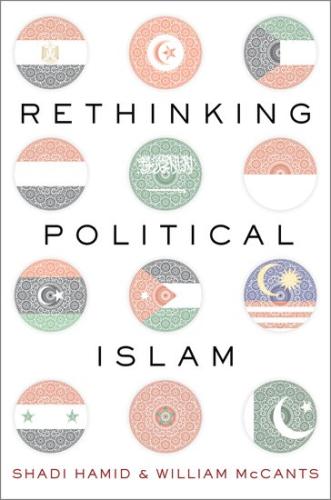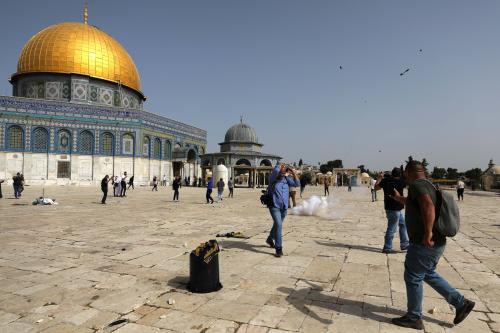Two months ago, Jared Kushner declared, as if tempting fate: “We are witnessing the last vestiges of what has been known as the Arab-Israeli conflict.” The theory of the case for President Donald Trump’s son-in-law and senior advisor was that the problem of Palestine could be solved by putting unprecedented pressure on the Palestinians. It was never entirely clear how this would work in practice. The presumption was that the threat of isolation, irrelevance, and the prospect of getting nothing rather than something would force the Palestinian Authority to accept far less than it might otherwise politically. This was novel. Whatever else one might say about Presidents Barack Obama or George W. Bush and their approaches to the conflict, they occasionally saw a place for carrots and not just sticks.
Another Kushner belief proved more prescient — that Arab nations could be peeled off from the Palestinians one by one. In other words, the Arab-Israeli conflict could be made separate from the Israeli-Palestinian conflict. Yet in a sense this is how it has been for decades. Washington had supported a separate peace between Israel and key neighbors, succeeding with Egypt in 1978 and with Jordan in 1994. Palestine was the reason there was an Arab-Israeli conflict in the first place. To then ignore Palestine in making peace with Israel suggested an intriguing feat of inversion.
In his book “Preventing Palestine,” the historian Seth Anziska offers a revisionist account of the Camp David Accords, President Jimmy Carter’s crowning foreign policy achievement. Originally, the vision was for a comprehensive settlement that would incorporate the Palestinians. In the talks, however, President Anwar el-Sadat’s top priority, arguably his own only priority, was regaining Egypt’s lost territory in the Sinai. In making peace with Israel, he would also secure Egypt’s place in the American orbit. But it came at a price — the downgrading of the Palestinian question. This may not have been the intention (at least not on Carter’s part), but it was the outcome. In Anziska’s telling, for the Palestinians at least, Camp David was something of an original sin, with the benefit of hindsight.
For Arab nations, there was always the pretense that their own peace with Israel would help the Palestinians. They may have even believed it. Perhaps diplomatic relations would allow them to influence Israel’s behavior. It would give them leverage. But in practice, much of the leverage they might have had was lost. Israel had gotten what it wanted — it had neutralized the military threat from key Arab challengers. What else did Egypt have to give?
Today, the United Arab Emirates, Bahrain, Morocco, and Sudan have been added to the list, via the “Abraham Accords.” Saudi Arabia, at least up until the current hostilities, seemed like it might be next. It was unprecedented. Crown Prince Mohammed bin Salman secretly met with Israeli Prime Minister Benjamin Netanyahu in November. Kushner was right that this would isolate the Palestinians. Palestinian leaders in the West Bank made no secret of their sense of betrayal.
Palestine had already receded from its (perceived) central role in the Arab imagination. The Arab Spring made clear that the primary battleground in the region wasn’t between Arabs and Israel but between regimes and their own people — or, more starkly, between regimes and Islamist movements. For autocrats, regime survival took precedence over everything else. For opposition groups, democratization at home was the focus. After prospects for democracy dimmed, survival became the all-consuming concern for them, too. The chaos and fragmentation of the Arab Spring and its aftermath made it unlikely that Palestinians would receive much attention from their Arab neighbors.
And so it became possible to imagine a flurry of Arab leaders feeling that it was the right time to move closer to Israel, benefitting from economic and security cooperation in the process. For Gulf countries — particularly Saudi Arabia — any such move would be sensitive. But with Palestine drifting lower on the regional agenda, the risk was tolerable. There might be grumbling, but little more. Even now, with the conflict in Gaza, the fallout will likely be minimal, particularly in countries where the media — including social media — is ever more tightly controlled by the state. Saudi Arabia, United Arab Emirates, and Bahrain are among the most repressive countries in the region. At the same time, they have been successful in fashioning new forms of nationalism, particularly among younger citizens.
Saudi Arabia is an interesting case. The al-Saud family has always relied on a particular religious legitimacy. As the Custodian of the Two Holy Mosques, it has often presented itself as prioritizing Islamic causes over narrower ones. Under Mohammed bin Salman, however, a new “Saudi nationalism” has emerged. In foreign policy, this translates into “Saudi Arabia first.” With this in mind, the fact that the hashtag “Palestine is not my issue” was trending in Saudi Arabia as the events in Gaza unfolded is not as surprising as it might seem. But it quickly provoked a counter-hashtag — “Palestine is our top issue.” Meanwhile, some prominent Saudi figures have struck a middle ground, perhaps sensing that this is the sweet spot for the Royal Court: harshly criticizing Israel, while also harshly criticizing Hamas. According to Andrew Leber, a Harvard doctoral candidate who studies Saudi social media, muted coverage in Saudi and Emirati-owned media has slowly given way to coverage far more critical of Israel. “Once official statements signaled that the Saudi government was weighing in firmly on the side of Palestinians, I started to see considerably more pro-Palestinian statements on Saudi Twitter,” he told me.
Palestine arouses passions. It always has, and it always will. It is one of the last remaining issues that can rally broad and genuine support across Arab borders. This is why messaging must be carefully managed by regimes. Transnational solidarity — whether in the form of pan-Arabism or Islamism — is a threat. It can’t easily be controlled. And so the goal is to limit and constrain it. For various regimes, then, the reemergence of fellow feeling toward the Palestinians is a problem. The timing isn’t great either. Just last year, Emirati and Saudi columnists like Abdelrahman Al-Rashed were calling the Abraham Accords “a great step that serves the Palestinian people first, and the UAE and the Arabs second,” although he had trouble sustaining this position for long.
This is all a bit messy. As the Emirati political scientist Abdulkhaleq Abdulla described it, the conflict in Gaza puts Israel’s new Arab partners in an “awkward position.” Awkwardness, however, is manageable. But this assumes that the conflict in Gaza, a leadership crisis in the West Bank, and Arab-Jewish communal violence in Israel itself can be contained. I unfortunately don’t know if it can or if it will. And neither do Arab leaders.
The Brookings Institution is committed to quality, independence, and impact.
We are supported by a diverse array of funders. In line with our values and policies, each Brookings publication represents the sole views of its author(s).










Commentary
A separate peace? What the Gaza crisis means for Arab regimes
May 16, 2021